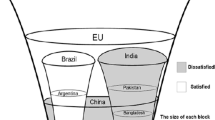Abstract
Belgium traditionally presents itself as a strong supporter of multilateral security cooperation and aims to be a reliable partner in the EU and NATO. Nevertheless, the uninterrupted decline of Belgium’s defence budget paints a different picture, that of a country that rides cheap on the defence efforts of its partners. Belgium does make equitable contributions to multinational military operations, but the lack of defence investments threatens to undercut its ability to continue to make substantial contributions to multilateral operations. This article builds on the literature on small states and military burden sharing to explain Belgium’s post-Cold War defence policy. More specifically, it argues that Belgium’s behaviour is anything but irrational, given that it allows to gain a high degree of security and influence at relatively low political and financial costs.


Similar content being viewed by others
References
Anrig, C.F. 2015. The Belgian, Danish, Dutch, and Norwegian Experiences. In Precision and Purpose: Airpower in the Libyan Civil War, ed. K.P. Mueller, 267–308. Santa Monica: Rand Corporation.
Auerswald, D.P., and S.M. Saideman. 2014. NATO in Afghanistan: Fighting Together, Fighting Alone. Princeton: Princeton University Press.
Biscop, S. 2013. Belgium. In Strategic Cultures in Europe Security and Defence Policies Across the Continent, ed. H. Biehl. Potsdam: Springer.
Blum, J., and Potrafke, N. 2019. Does a Change of Government Influence Compliance with International Agreements? Empirical Evidence for the NATO Two Percent Target. Defence and Peace Economics. https://doi.org/10.1080/10242694.2019.1575141.
Coolsaet, R. 2014. België en zijn buitenlandse politiek 1830–2015. Antwerpen: Van Halewyck.
Coolsaet, R. 2016. The Quest for Vital Interests and Objectives in the Foreign Policy of Belgium. Studia diplomatica 2: 9–23.
Dumoulin, A. 1992. La restructuration des forces armées. Courrier hebdomadaire du CRISP 38: 1–75.
Dumoulin, A. 2004. La Belgique et le Groupe des Quatre en matière de défense. Courrier hebdomadaire du CRISP 37: 5–71.
Dumoulin, A. 2009. La politique de défense de la Belgique: entre pragmatisme, variables d’ajustement et niches capacitaires. La Belgique en mutation. Systèmes politiques et politiques publiques 1968–2008: 359–392.
Dumoulin, A., and D. Resteigne. 2007. Le militaire belge en opérations: aspects politiques et sociologiques. Courrier hebdomadaire du CRISP 15: 5–48.
Eilstrup-Sangiovanni, M. 2014. Europe’s Defence Dilemma. The International Spectator 49(2): 83–116.
Federale Regering, 2011. Regeerakkoord. Brussels: Federal Regering.
Federale Regering, 2014. Regeerakkoord. Brussels: Federale Regering.
Flahaut, A., 2000. Het strategisch plan voor de modernisering van het Belgisch Leger 2000–2015. Brussels: Ministerie van Landsverdediging.
Fonck, D., T. Haesebrouck, and Y. Reykers. 2019. Parliamentary Involvement, Party Ideology and Majority-Opposition Bargaining: Belgian Participation in Multinational Military Operations. Contemporary Security Policy 40(1): 85–100.
Goetschel, L. 1998. The Foreign and Security Policy Interests of Small States in Today’s Europe. Small States Inside and Outside the European Union, 13–31. Berlijn: Springer.
Haesebrouck, T. 2016. Democratic Participation in the Air Strikes Against Islamic State: A Qualitative Comparative Analysis. Foreign Policy Analysis 14(2): 254–275.
Haesebrouck, T. 2017. NATO Burden Sharing in Libya: A Fuzzy Set Qualitative Comparative Analysis. Journal of Conflict Resolution 61(10): 2235–2261.
Haesebrouck, T., and M.V. Meirvenne. 2015. EUFOR RCA and CSDP Crisis Management Operations: Back on Track? European Foreign Affairs Review 20(2): 267–285.
Haesebrouck, T., and A. Thiem. 2018. Burden Sharing in CSDP Military Operations. Defence and Peace Economics 29(7): 748–765.
Hartley, K., and T. Sandler. 1999. NATO Burden-Sharing: Past and Future. Journal of Peace Research 36(6): 665–680.
Helmreich, J.E. 1964. Belgian Concern over Neutrality and British Intentions, 1906–14. The Journal of Modern History 36(4): 416–427.
Houben, M. 2004. International Crisis Management: The Approach of European States. Abingdon: Routledge.
International Institute for Strategic Studies. 2008. European Military Capabilities: Building Armed Forces for Modern Operations. London: IISS.
Jakobsen, J. 2018. Is European NATO really free-riding? Patterns of Material and Non-material Burden-Sharing After the Cold War. European Security 27(4): 490–514.
Jakobsen, P.V., J. Ringsmose, and H.L. Saxi. 2018. Prestige-Seeking Small States: Danish and Norwegian Military Contributions to US-Led Operations. European Journal of International Security 3(2): 256–277.
Jakubowski, S. 2007. Une politique de défense résolument internationaliste: le cas de la Belgique. Les Champs de Mars 1: 23–42.
Larson, E.V., et al. 2003. Interoperability of US and NATO Allied Air Forces: Supporting Data and Case Studies. Santa Monica: Rand Corporation.
Liégeois, M. 1993. La Belgique au Conseil de sécurité de l’Organisation des Nations Unies. Courrier hebdomadaire du CRISP 16: 1–56.
Liégeois, M. 2012. Making Sense of a Francophone Perspective on Peace Operations: The Case of Belgium as a Minofrancophone State. International Peacekeeping 19(3): 316–332.
Liégeois, M. 2015. Belgium’s Multilateral Politics 2010–2015. Studia diplomatica 68(2): 25–40.
Liégeois, M., and Glume, G. 2008. A Small Power Under The Blue Helmet The Evolution Of Belgian Peacekeeping Policy. Studia diplomatica, 111–138.
Lingelbach, W.E. 1933. Belgian Neutrality: Its Origin and Interpretation. The American Historical Review 39(1): 48–72.
Menon, A. 2004. From Crisis to Catharsis: ESDP After Iraq. International Affairs (Royal Institute of International Affairs 1944-) 80(4): 631–648.
Olson, M., and R. Zeckhauser. 1966. An Economic Theory of Alliances. Review of Economics and Statistics 48(3): 266–279.
Oma, I. M., and Petersson, M. 2019. Exploring the Role of Dependence in Influencing Small States’ Alliance Contributions: A Reputation Mechanism Argument and Assessment. European Security 28(1): 1–22.
Pedersen, R. B. 2020. Jumping on the Bandwagon: status seeking as a driver for Sweden’s involvement in NATO-led operations? International Politics 57(1): 41–56.
Reykers, Y., and Fonck, D. 2020. No wings attached? Civil–military relations and agent intrusion in the procurement of fighter jets. Cooperation and Conflict 55(1), 66–85.
Rickli, J.-M. 2008. European Small States’ Military Policies After the Cold War: From Territorial to Niche Strategies. Cambridge Review of International Affairs 21(3): 307–325.
Ringsmose, J. 2010. NATO Burden-Sharing Redux: Continuity and Change After the Cold War. Contemporary Security Policy 31(2): 319–338.
Sandler, T., and H. Shimizu. 2014. NATO Burden Sharing 1999–2010: An Altered Alliance. Foreign Policy Analysis 10(1): 43–60.
Sauer, T. 2015. Deep Cooperation by Belgian Defence: Absorbing the Impact of Declining Defence Budgets on National Capabilities. Defence Studies 15(1): 46–62.
Snyder, J. L., 1977. The Soviet Strategic Culture. Implications for Limited Nuclear Operations. DTIC Document.
van Landsverdediging, Ministerie. 1994. Witboek ‘94. Brussel: Ministerie van Landsverdediging.
Vandeput, S. 2016. Strategische visie voor defensie. Brussel: Ministerie van Defensie.
Weiss, T. 2019. Between NATO and a Hard Place: Defence Spending Debate in Germany and Czechia. European Security 28(2): 1–19.
Wivel, A. 2005. The Security Challenge of Small EU Member States: Interests, Identity and the Development of the EU as a Security Actor. Journal of Common Market Studies 43(2): 393–412.
Author information
Authors and Affiliations
Corresponding author
Ethics declarations
Conflict of interest
The author states that there is no conflict of interest.
Additional information
Publisher's Note
Springer Nature remains neutral with regard to jurisdictional claims in published maps and institutional affiliations.
Rights and permissions
About this article
Cite this article
Haesebrouck, T. Belgium: the reliable free rider. Int Polit 58, 37–48 (2021). https://doi.org/10.1057/s41311-020-00221-z
Published:
Issue Date:
DOI: https://doi.org/10.1057/s41311-020-00221-z



